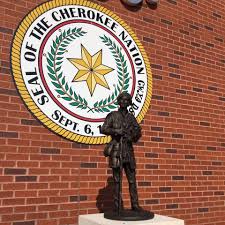
- Details
- By Chuck Hoskin Jr
Guest Opinion. The Cherokee people are deeply connected to the land and historic locations across our reservation in northeast Oklahoma. Decades before statehood, Cherokees built the first schools, courthouses, modern roads and more in this place. The historic sites on our reservation are a testament to the resilience of the Cherokee people, who built thriving new communities from scratch after our removal on the Trail of Tears.
Cherokee Nation is committed to celebrating and preserving those historically significant sites. They are vital reminders of our history, and we must preserve them to honor the accomplishments and sacrifices of our ancestors and to educate future generations.
I recently signed new legislation that commits $1 million to preserve places of significance in Cherokee history, as well as to commission official biographies and historical publications. I appreciate the Council of the Cherokee Nation for unanimously supporting the proposal for the Cherokee Nation Historic Places Preservation Fund put forward by Deputy Chief Bryan Warner and myself.
The new fund will support restoration and maintenance of properties listed on the Cherokee Nation Registry of Historic Places. The registry currently lists 16 sites that are important to our tribe and for all Oklahomans, as they are part of our state’s collective history. The new law, which amends the Cherokee Nation Registry of Historic Places Act of 2019, creates a dedicated funding stream by transferring $1 million of existing cultural review revenue. Going forward, the fund will receive annual proceeds of agriculture and business leases of up to $1 million per year. The new fund will also receive 50 percent of fines collected for violations of the Historic Registry Act.
By investing in historic preservation, we are also creating opportunities for economic development and cultural tourism. Visitors from all over the globe travel to our 7,000-square-mile reservation to learn about Cherokee culture and history. These sites create opportunities for meaningful experiences and a better appreciation of Cherokee culture.

Our efforts to preserve our history are not limited to physical restoration of these sites. We also know it’s important to share the stories associated with them. The exhibits and programs developed by our Cultural Tourism division provide that deeper understanding of Cherokee culture and history. The expanded law also authorizes the Secretary of Natural Resources’ office to commission official biographies of former Principal Chiefs and official histories of the tribe’s legislative and judicial branches.
We recently added the Little Flock Baptist Church in Nowata County to the historic registry. Cherokee Freedmen and others in the community formed the congregation in 1887. Built in the early 1900s, the church was a center of religious, educational, and cultural life for the surrounding Cherokee Freedmen community for more than 100 years. The structure showcases the unique stone masonry work commonly found in Cherokee Freedmen communities.
Knowledge of our history is a great inspiration for our lives today. We cannot understand the present without knowing how we got here, including both the highs and the lows. The darker parts of history can sometimes make us uncomfortable, but it is foolish to flinch away. Instead, we must be open to the whole story, to build on the successes of our ancestors and to learn from their mistakes.
Chuck Hoskin, Jr. is the principal chief of the Cherokee Nation.
More Stories Like This
The SAVE America Act Threatens Native Voting Rights — We Must Fight BackThe Presidential Election of 1789
Cherokee Nation: Telling the Full Story During Black History Month
Jesse Jackson Changed Politics for the Better
Native News Online at 15: Humble Beginnings, Unwavering Mission
Help us defend tribal sovereignty.
At Native News Online, our mission is rooted in telling the stories that strengthen sovereignty and uplift Indigenous voices — not just at year’s end, but every single day.
Because of your generosity last year, we were able to keep our reporters on the ground in tribal communities, at national gatherings and in the halls of Congress — covering the issues that matter most to Indian Country: sovereignty, culture, education, health and economic opportunity.
That support sustained us through a tough year in 2025. Now, as we look to the year ahead, we need your help right now to ensure warrior journalism remains strong — reporting that defends tribal sovereignty, amplifies Native truth, and holds power accountable.
 The stakes couldn't be higher. Your support keeps Native voices heard, Native stories told and Native sovereignty defended.
The stakes couldn't be higher. Your support keeps Native voices heard, Native stories told and Native sovereignty defended.
Stand with Warrior Journalism today.
Levi Rickert (Potawatomi), Editor & Publisher

